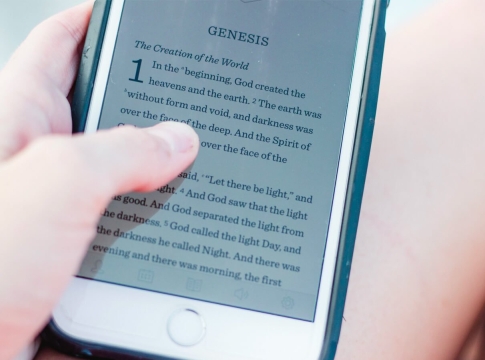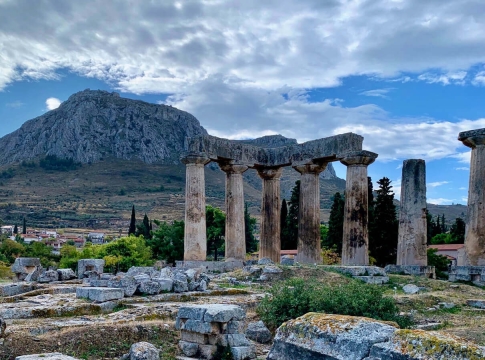
The history of Israel is summarized in the books of 1 and 2 Chronicles, which cover the time from Adam (the first human) to the people’s return from exile in 500 BC. This book aims to provide optimism in the face of bleak conditions.
Historical background
The books of Chronicles were written after the Israelites returned from exile and the temple was rebuilt, probably around 400 BC. The people had received (part of) their land back, which fulfilled the centuries old prophecies to Abraham, Isaac and Jacob (see for example Genesis 15:18-21; 26:1-4; 48:4). Their numbers were much smaller than before, but they still existed as a people. The temple had been rebuilt, symbolizing God’s presence among them. And yet… the promises of restoration and abundance were only partially fulfilled. They were still subjected to foreign kings and surrounded by hostile people groups. This raised questions about God’s plans for Israel, especially about His promises to David about a never-ending dynasty (1 Chronicles 17:11-14). Against this background, the books of Chronicles look back and look forward.
Author
It is uncertain who wrote the volumes of Chronicles. He was most likely a Levite or priest with access to the temple texts. Ezra, who is described in Ezra 7:6 as “a scribe skilled in the Law of Moses that the Lord, the God of Israel, had given,” may have been the author. After living in Babylonia, he went back to Israel to instruct the populace in God’s rules. He is mentioned in the book of Ezra.
Outline of the books
- Generologies and listings are found in 1 Chronicles 1–9. Because they were selected by God to be the royal line of Israel, these put a specific emphasis on the line from Judah to David and his offspring. This family line would give birth to the Messiah. The priests and Levites, who are essential to the temple, are also given a lot of attention.
- In 1 Chronicles 10–29, David is mentioned. He is described as a representation of [the future Messiah]. Chronicles’ author mostly focuses on positive events in David’s life, including his preparations for the construction of the first temple.
- Solomon, the son of David, and the construction of the temple itself are the subjects of 2 Chronicles 1–9.
- 2 Chronicles 10–36 tells the story of Israel’s collapse and subsequent kings. Stories regarding the northern kingdom are absent from Chronicles, a notable departure from the books of Kings. It only concentrates on the kingdom in the south, with Jerusalem as its capital.
- The last chapter, which describes how King Cyrus allows the Israelites to return to their land, inspires hope.
Key theme: seeking God
The purpose of the volumes of Chronicles is to impart important lessons as well as historical facts. The author uses the concept of “seeking God” vs “leaving God” to illustrate historical examples. He exhorts the reader to “seek the Lord and his strength; seek his presence continually” through these stories. 16:11 in 1 Chronicles.
Seeking God consists of:
- “Glory in His holy name; let the hearts of those who seek the Lord rejoice!” is a cry of praise and celebration for God. 16:10 in 1 Chronicles.
- Maintaining the Temple: “At this point, resolve to seek the Lord, your God, with all of your heart. Get up and construct the Lord God’s sanctuary so that the sacred vessels and the ark of the covenant might be taken into a building dedicated to the Lord’s name. (1 Chronicles 13:3–22:19; see comparison)
- Respecting God’s commands: “And Asa commanded Judah to keep the law and the commandment, and to seek the Lord, the God of their fathers.” Compared to 1 Chronicles 10:13 and 15:13, note 2 Chronicles 14:2-4.
- Eliminating idols: “[Josiah] started seeking the God of David, his father, when he was still a boy, in the eighth year of his reign, and in the twelfth year he began to purge Judah and Jerusalem of the high places, the Asherim, and the carved and the metal images” (2 Chronicles 34:3; also in 2 Chronicles 14:2-3).
- In times of difficulty, seeking assistance from God: “And Judah assembled to seek help from the Lord; they came to seek the Lord from all the cities of Judah.” 20:4 in Chronicles.
It is deemed “evil” to not seek the Lord (2 Chronicles 12:14). It is also known as “breaking faith with God” or “not doing what is right in the eyes of the Lord.” Chronicles’ author makes it very evident that blessings come from seeking the Lord alone. Allow me to provide some instances:
- Hear me, Asa, and all of Judah and Benjamin: As long as you are with the Lord, He will be with you. You will find Him if you seek Him out; nevertheless, if you turn away from Him, He will turn away from you. Chapter 15 of 2 Chronicles
- In the days of Zechariah, who taught him to fear God, Uzziah “set himself to seek God, and as long as he sought the Lord, God made him prosper.” 26:5–26 Chronicles.
- “And with all his heart, seeking God, Hezekiah accomplished all the work he undertook in the house of God’s service, in compliance with the law and the commandments, and it prospered.” 31:21 in 2 Chronicles
The Lord God was frequently betrayed by the people of Israel and their monarchs. Thus, they were [sent into exile], in the same way as the people who had lived in the northern kingdom decades before. The destruction of Jerusalem and its temple is recorded in 1 Chronicles 5:25–26, 9:1, and 2 Chronicles 36–18–20.
Key theme: repentance
The people in the books of Chronicles are not only split into two categories: those who seek the Lord and those who do not. All persons are, in actuality, “evil” and “sinful.” According to 1 Chronicles 21:7, even David, who is regarded as the perfect monarch and the prototype of the future Messiah, occasionally does things that “displease God.” But we also see him express regret in this passage: “And David confessed to God, ‘I have sinned deeply in that I have done this thing. I have acted exceedingly foolishly, so please forgive your servant of his transgression now (1 Chronicles 21:8). David’s transgressions are not ignored by God; rather, He provides a path back to Him (1 Chronicles 21:26–28).
David is not the only one who can experience [forgiveness and repentance]. It is extended to everyone. According to God’s promise recorded in 2 Chronicles 7:14, “I will hear from heaven and will forgive their sin and heal their land if my people who are called by my name humble themselves, and pray and seek my face and turn from their wicked ways.” A few remarkable tales of King Rehoboam and King Manasseh were read to us.
- Due to his poor judgment, Rehoboam split Israel into two kingdoms: the southern and the northern (see 2 Chronicles 10). In addition, he “abandoned the law of the Lord” (2 Chronicles 12:1), which paved the way for an Egyptian invasion. But according to 2 Chronicles 12:12, “when he humbled himself, the wrath of the Lord turned from him, so as not to make a complete destruction.”
- Manasseh was an extremely evil king. He erected altars for idols (even in God’s temple), worshiped the stars, burned his sons as an offering to idols, used fortune-telling, omens and sorcery, and dealt with mediums and with necromancers (2 Chronicles 33:1-9). Let me quote the surprising development of his life story in full:
“The Lord spoke to Manasseh and to his people, but they paid no attention. Therefore the Lord brought upon them the commanders of the army of the king of Assyria, who captured Manasseh with hooks and bound him with chains of bronze and brought him to Babylon. And when he was in distress, he entreated the favor of the Lord his God and humbled himself greatly before the God of his fathers. He prayed to him, and God was moved by his entreaty and heard his plea and brought him again to Jerusalem into his kingdom. Then Manasseh knew that the Lord was God.” (2 Chronicles 33:10-13).
Hope for the future
The ruin of Israel and the start of their restoration are both chronicled in the books of Chronicles. “Thus says Cyrus king of Persia, ‘The Lord, the God of heaven, has given me all the kingdoms of the earth, and he has charged me to build him a house at Jerusalem, which is in Judah,” states the concluding passage. May the Lord, God of all his people, be with whoever is among you. Permit him to ascend. 36:23 in 2 Chronicles.
God’s fidelity to His covenant with Israel and with David, whose royal lineage persisted, was shown in the reconstruction of the temple and the people’s return (1 Chronicles 3:19–24). The words of 2 Chronicles 7:14, “If my people who are called by my name humble themselves, and pray and seek my face and turn from their wicked ways, then I will hear from heaven and will forgive their sin and heal their land,” were true, and the Lord God had not changed.
Lessons for us
The Israelites were the books of Chronicles’ original intended readership. Nonetheless, modern Christians can also learn some crucial lessons:
- It is our duty to “seek the Lord” and cling to Him. His blessing will follow from this.
- God extends an invitation to turn from our sins and return to Him if we have done so.
- Even when we can’t see it today, God is still [true to His promises]. We have hope that He will finish His work because of the partial fulfillment that is already apparent!





